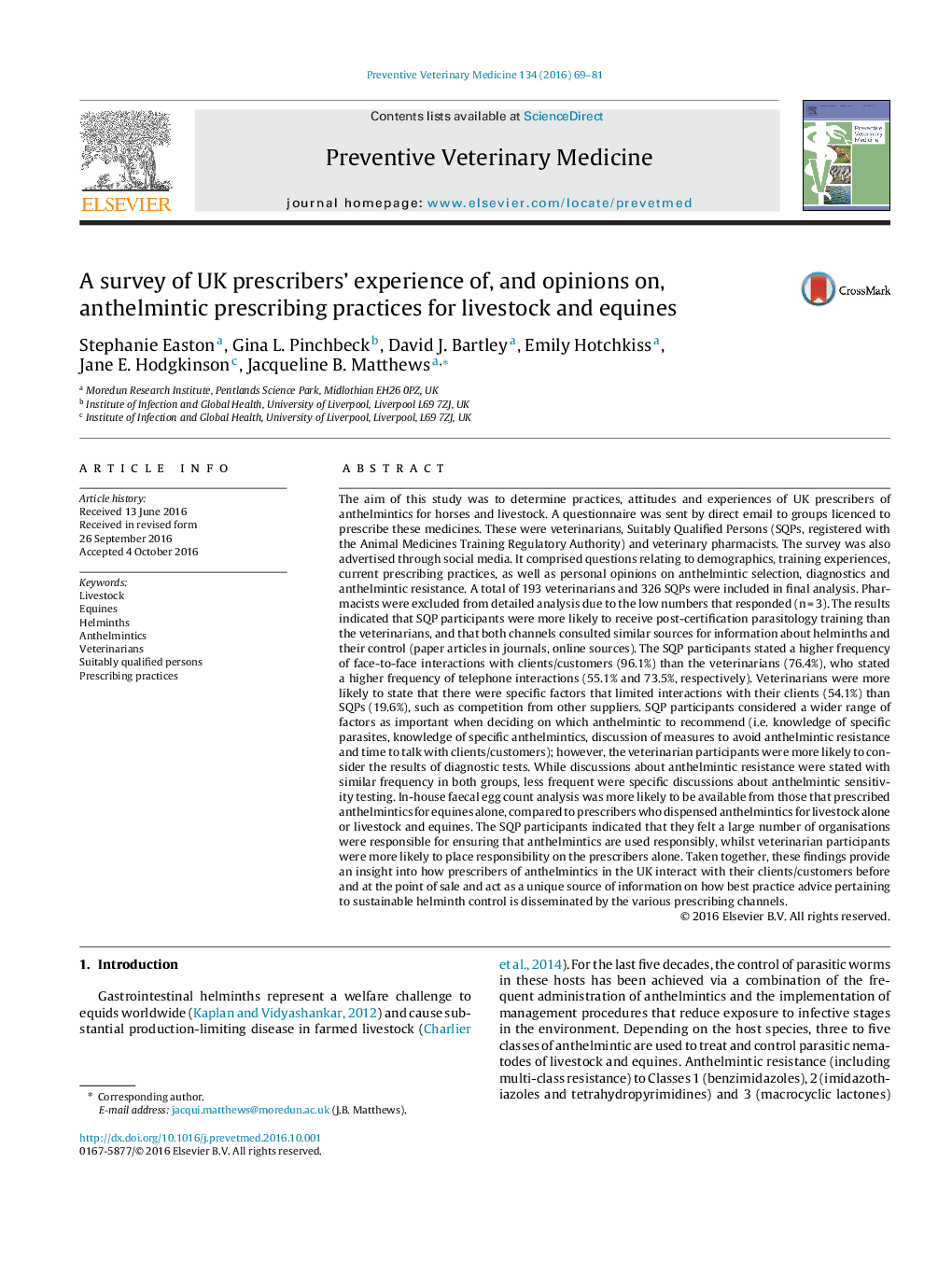| کد مقاله | کد نشریه | سال انتشار | مقاله انگلیسی | نسخه تمام متن |
|---|---|---|---|---|
| 5543618 | 1554154 | 2016 | 13 صفحه PDF | دانلود رایگان |
عنوان انگلیسی مقاله ISI
A survey of UK prescribers' experience of, and opinions on, anthelmintic prescribing practices for livestock and equines
ترجمه فارسی عنوان
یک بررسی از تجویز شده انگلستان و نظرات در مورد تجویز داروهای ضد سرطان برای دام و اسب ها
دانلود مقاله + سفارش ترجمه
دانلود مقاله ISI انگلیسی
رایگان برای ایرانیان
کلمات کلیدی
دامداری، اسب ها، هلمند انتهلمینتیک، دامپزشکان، افراد واجد شرایط واجد شرایط تجویز داروها،
موضوعات مرتبط
علوم زیستی و بیوفناوری
علوم کشاورزی و بیولوژیک
علوم دامی و جانورشناسی
چکیده انگلیسی
The aim of this study was to determine practices, attitudes and experiences of UK prescribers of anthelmintics for horses and livestock. A questionnaire was sent by direct email to groups licenced to prescribe these medicines. These were veterinarians, Suitably Qualified Persons (SQPs, registered with the Animal Medicines Training Regulatory Authority) and veterinary pharmacists. The survey was also advertised through social media. It comprised questions relating to demographics, training experiences, current prescribing practices, as well as personal opinions on anthelmintic selection, diagnostics and anthelmintic resistance. A total of 193 veterinarians and 326 SQPs were included in final analysis. Pharmacists were excluded from detailed analysis due to the low numbers that responded (n = 3). The results indicated that SQP participants were more likely to receive post-certification parasitology training than the veterinarians, and that both channels consulted similar sources for information about helminths and their control (paper articles in journals, online sources). The SQP participants stated a higher frequency of face-to-face interactions with clients/customers (96.1%) than the veterinarians (76.4%), who stated a higher frequency of telephone interactions (55.1% and 73.5%, respectively). Veterinarians were more likely to state that there were specific factors that limited interactions with their clients (54.1%) than SQPs (19.6%), such as competition from other suppliers. SQP participants considered a wider range of factors as important when deciding on which anthelmintic to recommend (i.e. knowledge of specific parasites, knowledge of specific anthelmintics, discussion of measures to avoid anthelmintic resistance and time to talk with clients/customers); however, the veterinarian participants were more likely to consider the results of diagnostic tests. While discussions about anthelmintic resistance were stated with similar frequency in both groups, less frequent were specific discussions about anthelmintic sensitivity testing. In-house faecal egg count analysis was more likely to be available from those that prescribed anthelmintics for equines alone, compared to prescribers who dispensed anthelmintics for livestock alone or livestock and equines. The SQP participants indicated that they felt a large number of organisations were responsible for ensuring that anthelmintics are used responsibly, whilst veterinarian participants were more likely to place responsibility on the prescribers alone. Taken together, these findings provide an insight into how prescribers of anthelmintics in the UK interact with their clients/customers before and at the point of sale and act as a unique source of information on how best practice advice pertaining to sustainable helminth control is disseminated by the various prescribing channels.
ناشر
Database: Elsevier - ScienceDirect (ساینس دایرکت)
Journal: Preventive Veterinary Medicine - Volume 134, 1 November 2016, Pages 69-81
Journal: Preventive Veterinary Medicine - Volume 134, 1 November 2016, Pages 69-81
نویسندگان
Stephanie Easton, Gina L. Pinchbeck, David J. Bartley, Emily Hotchkiss, Jane E. Hodgkinson, Jacqueline B. Matthews,
